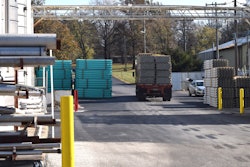With a new administration in Washington bent on changing federal immigration policy and enforcement, many in and around trucking have wondered: Does trucking have an "open borders" problem?
At the Mid-America Trucking Show in March, the Federal Motor Carrier Safety Administration got peppered with questions about English language proficiency and "non-domiciled CDLs," CDLs issued by one state to residents of another, or of a foreign country.
Those are "live issues" which "will be addressed in the near future," according to FMCSA Chief Counsel Jesse Elison.
[Related: FMCSA Chief Counsel on deregulating trucking, English proficiency and non-domiciled CDLs]
The questions mostly came from members of a group who allege unvetted, unsafe foreign drivers are flooding into the country and leaving a trail of destruction, likewise tanking rates and wages for American truckers. The group, called American Truckers United (ATU), points to what they see as a broken, dangerous system, making note of high-profile crashes like a recent one that killed five and another whose responsible party was a truck driver who had been deported 16 previous times.
ATU also suggested some wild spikes in driver counts among newly registered carriers in FMCSA's Motor Carrier Management Information System was evidence of "labor dumping," bringing in a critical mass of foreign workers that will accept lower compensation to drive down rates and wages across the trucking profession.

Those strange spikes in driver counts (the state of Nevada showing a boost of 80,000 drivers amid the dismal freight slump of 2024, for instance), coupled with the fact that trucking capacity has remained stubbornly high despite a long lull in rates, made for a real head-scratcher.
"Despite naggingly low rates, interstate motor carrier counts posted their first net positive month in over 2.5 years" in March of this year, said DAT Chief of Analytics Ken Adamo. The total carrier population remained seven percent higher than the pre-COVID trend.
Do those crazy driver-count spikes possibly explain the stubbornly high carrier population? Not really, according to FMCSA and state authorities.
[Related: Who is really hauling all the cheap freight? Owner-operators weigh in]
First of all, MCMIS driver counts don't represent the number of CDLs issued by states, just the number of CDL drivers reported by carriers to FMCSA. The numbers also include all drivers reported by companies in the system, so Class B CDL drivers in addition to Class 8, bus and limo drivers, and everyone else, muddy the waters.
The biggest MCMIS spike in driver counts appeared in the state of Oregon in year 2022. Overdrive contacted Oregon's licensing agency and heard back that the MCMIS numbers wildly mismatched the state's own CDL issuance data.
Overdrive asked FMCSA about the difference.
"There was an outlying data point in our system that accounts for the spike in the number of CDL drivers reported by newly registered carriers in the state of Oregon in 2022," an FMCSA spokesperson told Overdrive. "The spike was due to one carrier reporting 97,164 CDL drivers, although that carrier had only one vehicle."
97164 actually happens to be a zip code in the Portland, Oregon, area.
To say the least, FMCSA believes mistakes were made with carriers' self-reported driver counts. "Once this outlier is removed, the CDL counts are in line with other years," the spokesperson continued.
Even more important, FMCSA noted about driver counts in MCMIS: "Even though a carrier may be based in Oregon, that does not mean all of that carrier’s CDL drivers were issued CDLs by the state of Oregon. For example, if a carrier has divisions across the U.S., they may have drivers who report to division offices in other states. It would be very likely that those drivers received their CDLs from the states in which those division offices are located."
While FMCSA didn't exactly say it had found other bad carrier reporting that caused the other spikes in driver counts in MCMIS data, they'd all be subject to the same data-quality concerns.
The American Trucking Associations went so far as to publish a blog post entitled "No, millions of foreign truck drivers aren’t flooding into the U.S.", raising a litany of similar data-quality issues around ATU's assertions of labor dumping.
"Anyone who repeats this inaccurate claim needs a better understanding of how MCMIS data is collected and how this data can be manipulated to advance a political agenda," ATA wrote, saying the narrative of "foreign labor dumping" in U.S. trucking "is false and does not hold up to minimum scrutiny."
Both groups agree on one thing, though: It's a problem that nobody in the federal government knows how many non-domiciled CDLs have been issued by states to residents of foreign countries.
[Related: Showdown over non-citizen drivers brewing in Arkansas state house]
In a recent letter to Department of Transportation Secretary Sean Duffy, ATA President Chris Spear, echoing what the Owner-Operator Independent Drivers Association recently told Congress, called for DOT to "begin better tracking the number of new CDLs issued on a state-by-state basis, including, but not limited to, the number of non-domiciled CDLs that are issued on an annual basis."
Asked to elaborate on the organization's stand on non-domiciled drivers, Jeremy Kirkpatrick, VP of public affairs and strategic communications at ATA, focused on safety.
"Make no mistake: if a driver is here illegally and operating a CMV illegally, they must be removed from the road immediately," said Kirkpatrick. "We also believe more data would help bring clarity to a topic that is getting obfuscated by misinformation, which is why we’ve called for more consistent reporting from DOT on these figures."
Overdrive asked FMCSA, the American Association of Motor Vehicle Administrators and the Commercial Vehicle Safety Alliance if they knew how many non-domiciled CDLs were issued in the U.S., and they all said no.
"Despite some false claims to the contrary, there is no legal pathway that lets foreign drivers obtain a U.S. CDL while bypassing the testing and training standards set forth in the regulations," Kirkpatrick continued. Per the regulations, every CDL driver in the country, wherever they're from, must still pass a knowledge and road test, get a med certification, and demonstrate "the ability to read and speak the English language sufficiently," as well as comply with drug testing, hours of service, and safety regs, he said.
Yet not every medical office or CDL trainer operates the same way. Trade groups representing CDL schools recently called out FMCSA for not booting bad actors from the approved list of training providers, citing "24-hour schools" that "teach you the test" and a serious "threat" to safety from bad actors.
Kirkpatrick noted that ATA supported the enforcement actions recommended by the CDL school trade groups.
[Related: CDL schools call out 'threat' of 'unscrupulous training entities']
The Owner-Operator Independent Drivers Association's recent testimony to Congress about the dangers of taking English language proficiency out of the out-of-service criteria likewise offered its stance on the issue of non-domiciled drivers.
"The core question is what the hell is a non-domiciled CDL, anyway?" said OOIDA President Todd Spencer this week. Having no data on the number of non-citizen drivers "makes no sense whatsoever" and is a data point FMCSA "needs to have their arms wrapped around and know clearly what it is."
Spencer expressed concern that states issuing non-domiciled CDLs weren't vetting the foreign drivers. One CDL school operator told Overdrive that Texas had seen an influx of faked foreign credentials used in the CDL application process.
"If they're going to grant someone the ability to operate large commercial motor vehicles, they need to be damn sure they have the ability to safely do that," said Spencer.
[Related: OOIDA urges Congress to act on non-domiciled CDLs, English proficiency]
While Spencer said OOIDA remained unsure about how many non-domiciled CDLs had been issued or how many foreign drivers worked in the country, he took issue with the very idea of granting visas to let foreigners come to the U.S. and drive Class 8 trucks.
"The theoretical rationale for [foreign drivers with non-domiciled CDLs] was to address a worker shortage," said Spencer. "But there’s never been a demonstrated worker shortage in trucking, there's never been a shortage recognized by the Department of Labor, and the employment needs for trucking are no greater than any other industry."
In conclusion, Spencer found "no justification whatsoever for special visas" for trucking but made it clear his stance wasn't an attack on immigrant groups or drivers of different nationalities.
Foreign drivers "are attractive to people in trucking generally because they’re not going to ask for much," said Spencer. "Unfortunately, they’re going to be fairly easy to exploit and these are the kinds of practices that have gone on in trucking for decades."
[Related: The driver shortage alarm: Where are the empty shelves, aggressive rates, and higher pay?]










